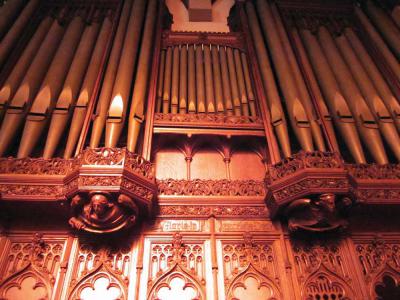September 18, 2014
 The chancel organ facade at All Saints, behind which the restored Skinner organ will be installed. Jeffrey Gonyeau photo
The chancel organ facade at All Saints, behind which the restored Skinner organ will be installed. Jeffrey Gonyeau photo
Dorchester preservationists, music lovers, and parishioners of All Saints Church are pulling out all the stops to get supporters to a benefit organ recital this Sunday in Cambridge to help the Ashmont parish finish funding the installation of a renovated 1929 Skinner organ – one manufactured in its heyday by the Dot-based Skinner Organ Company, the premier organ maker in the country.
In spite of Dorchester’s status as the company’s home base, there are currently no Skinner organs in working condition in the neighborhood. All Saint’s Skinner will represent a homecoming for one of the neighborhood’s signature products.
This Sunday (Sept. 21) at 4 p.m., the renowned organist William Porter will play at Harvard’s Memorial Church to help meet challenge grants to fully finance the restoration. Professor Porter has performed at major international festivals and academies in Europe and North America. He has recorded for the Gasparo, Proprius, BMG, and Loft labels.
Earlier this year, All Saints acquired the vintage Skinner organ from the now-shuttered First United Methodist Church in North Adams. Ideal in size, sound, and pedigree, the Skinner Organ Co.’s Opus 708 is an answered prayer to the problem of the church’s failing chancel organ. Thanks to a generous gift, All Saints was able to acquire and store the instrument, arranged through organ consultant and parishioner Jonathan Ambrosino, organ restorer Joe Sloane, and the help of church volunteers.
Skinner organs excel at choral accompaniment, a critical requirement at All Saints, where the instrument is used to accompany the parish’s Choir of Men and Boys, one of fewer than twenty such ensembles left in America today.
The Skinner Organ Co. (and later the Aeoilian-Skinner Co.) was located at 215 Sydney Street from 1905 to 1968, employing about 250 craftspeople. (Half of the original Skinner factory building was torn down in 1955 to make way for the Southeast Expressway; the remaining half was recently renovated as the Boston Collegiate Charter School’s Lower School.)
From this Dorchester factory, Skinner built what many consider to be the finest American pipe organs of the first half of the 20th century. In reviewing Skinner’s instruments, the organists’ monthly Diapason put it at the time: “Here, unquestionably, is an organ that can stand the test of concerted work with a great symphony orchestra—that can fight the orchestra on its own grounds, asking no quarter, no handicap, no favors.”
Last spring, the Joseph G. Bradley Foundation awarded All Saints a $55,000 one-to-one challenge grant to close the remaining $110,000 gap to fully fund the Skinner project. An additional recent challenge grant from an anonymous donor, who will also match all contributions up to $17,500, means that every $1 that the recital generates will yield $4 for the project (up to the ceilings of the two challenge grants).
For his Harvard recital, Professor Porter will play works by Camille Saint-Saëns, Charles Tournemire, and Marcel Dupré on the Skinner organ, and Charles-Marie Widor’s “Symphonie Romane.”
“The Parish of All Saints is deeply grateful to Professor Porter for proposing the idea of this recital and for giving of his time and talent in bringing it about,” said All Saints’ Rector, Fr. Michael Godderz. “A long-time friend of the parish, he is often seen at festival services, and he is further linked to All Saints as a teacher of current Organist and Choirmaster, Andrew Sheranian.” He added, “All Saints also extends its heartfelt thanks to our friends at the Memorial Church for their support and gracious hospitality in hosting this recital.”
For more information on the recital or making tax deductible contributions to the Skinner project, visit allsaints.net.


